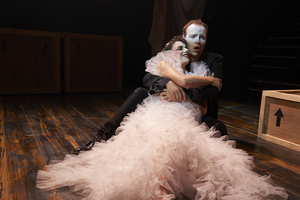Review: BLACK, EL PAYASO, THE CLOWN, Grimeborn Festival, Arcola Theatre
A Spanish operetta makes its UK debut and provides much to enjoy and much to think about

 Black and White leap out of their boxes and remind us of the peculiar place clowns hold in our imaginations. Like absolute monarchs (and dictators), they can transgress rules with impunity - it makes them unpredictable, scary, other. Kings have kept them close by in the past to remind them of their own humanity and to preserve a little humility and clowns have poked fingers in the royal eye to do so and, perhaps, as a proxy for the people. There's a (ex) clown jabbing the Russian Bear right now in Kyiv.
Black and White leap out of their boxes and remind us of the peculiar place clowns hold in our imaginations. Like absolute monarchs (and dictators), they can transgress rules with impunity - it makes them unpredictable, scary, other. Kings have kept them close by in the past to remind them of their own humanity and to preserve a little humility and clowns have poked fingers in the royal eye to do so and, perhaps, as a proxy for the people. There's a (ex) clown jabbing the Russian Bear right now in Kyiv.
So one hardly needed the prompting in the programme to know that this is a political piece, its writer, Pablo Sorozábel, a Spanish liberal in 1942 living under General Franco's icy gaze. Yes it has its comic moments, its reflections on the nature of identity and love, but it's also a warning that the populace can be stirred and quelled quickly and that those doing so may be clowns more minded to the malevolent side of their characters, not the amusing.
Ignacio Garcia's adaptation of Serrano Anguita's libretto (itself based on Jean-José Frappa's French novel, La princesses aux clowns) cuts back the range of characters, simplifies the story somewhat (helped by a child narrator, Simon Bundock) and focuses on the two clowns' brief sojourn at court. This is what Grimeborn does with new works, or like this one, new works to the UK or with the classics - and, in so doing, it finds new audiences. It's good to have the annual Festival back in its late summer slot.
As has been the case for ten years or more here, the singing is splendid. Michael Lafferty finds the ache of Black the Clown's love for his princess fighting with his reluctance to take on the crown deep within his luscious baritone. There's a plaintive pleading too in his repeated request to be loved for his individual humanity, not for the office and prestige of the prince for whom he is mistaken.
His fellow lord of misrule turned lord of rule, White, has no such qualms, embracing his role as minister, inventing a convoluted backstory to substantiate his new identity, but he's just as quick to reclaim his old ways when insurrection reaches the palace gates. Giuseppe Pellingra has a lot of fun with his clever, ruthless, stateless comedian.
But not as much fun as Juliet Wallace has with Catalina, the princess's sister and adviser, all heaving bosoms and batting eyelashes and a supercharged soprano voice. More subtle (she is going to be queen after all) Raphaela Papadakis piles on the emotional power, her soprano beautifully balanced against the music (Richard Gosalbo and Elena Jáurgui in super form), the lonely exile from her homeland suddenly given the chance to rekindle the love for her long lost fiancé and her distant country. Why wouldn't she seize it, even if she's fooling herself?
The cast is rounded out by David Powton's doubling as Marat, a journalist digging for court gossip and Charles Dupont, a pianist who soon reveals himself to be the real prince whose identity Black the Clown has, albeit reluctantly, assumed. His work ensures that there is no weak link in the vocals nor in the undertow of comedy that sits beneath the more tragic elements of the theme of loss that runs through the whole operetta.
Director, Paula Paz, keeps the pace up, bringing the zarzuela in at just over 90 minutes of singing in Spanish and speaking in English (there's quite a lot of that, giving the evening more than a touch of a night at a musical). Whether there's just too much plot to unpack in that run time and whether we might benefit from two halves of 50 minutes or so split by an interval, is moot, but one should congratulate Cervantes Theatre for avoiding the temptation to sprawl - plenty of other companies could learn from that decision.
This production isn't full of great tunes (though it has its fair share) and its allegories and metaphors stack on top of each other, with the politics of both the 20th and 21st centuries never far from one's thoughts. It can be a demanding watch at times, but it's packed with stimulating ideas, innovative music and in wrapped in a form that resists easy classification for those (and that'll be most of us) unfamiliar with the traditions of Spanish opera. It's exactly what Grimeborn is for.
Black, El Payaso, The Clown is at the Arcola Theatre until 6 August and then at the Cervantes Theatre 20-24 September
Photo Credit: Cervantes Theatre
Reader Reviews
Videos

